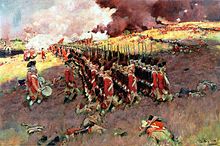Bunker Hill Day – June 17th
 The Battle of Bunker Hill (that took place on nearby Breed’s Hill)
The Battle of Bunker Hill (that took place on nearby Breed’s Hill)
Notwithstanding the recent decision of the Great and General Court, Bunker Hill Day commemorates a day of great historical significance to the Commonwealth of Massachusetts, to the country, to the conduct of the American Revolutionary War.
Notes from the Registery of Deeds Middlesex North (June 16, 2009) website:
Despite all of the negative publicity that now surrounds this particular “holiday”, the Battle of Bunker Hill is worth remembering. To place it in context, the fight at Lexington and Concord occurred on April 19, 1775. In the aftermath of that British raid, thousands of colonial militia gathered outside of Boston and laid siege to the city. During the overnight hours of June 13, 1775, American forces occupied Breed’s Hill which was to the northwest of Boston and separated from the city by water. When the British discovered the colonial forces present and entrenched on the hill, they set out to attack. Although some British leaders recommended landing a force to the rear of the American positions and thereby cutting off any chance of retreat, the British commander, General William Howe, decided that a frontal attack was more appropriate under the circumstances. This they did on June 17, 1775. The first two British assaults were beaten back with heavy casualties and it was only after the Americans began to run out of ammunition did the British capture the position. The British suffered more than 1000 casualties, more than in any other battle during the entire Revolution, while the American casualties were 450. Dick Howe
Read this account: “June 17, 1825 – Bostonians Lay the Cornerstone for the Bunker Hill Monument” here at Mass Moments. An excerpt:
Daniel Webster addressed a crowd of 100,000, including 190 veterans who had survived the first major battle of the Revolution — an encounter between colonial militiamen and a larger number of better-trained and equipped British Regulars. Eventually the Redcoats prevailed, but half their men were killed or wounded in the process. The militiamen suffered high casualties, too, but they — and people throughout the colonies — took heart from the strong defense they mounted. Fifty years later, “on the ground distinguished by their valor … and the shedding of their blood,” Webster called on Americans to make a thriving democracy and a strong union a living memorial to the men who had died there.
